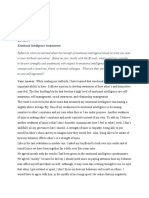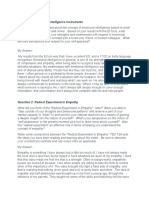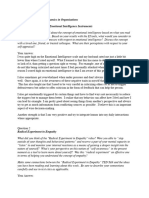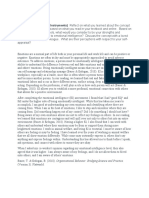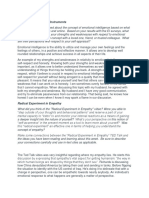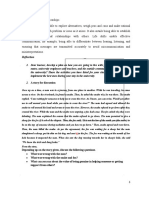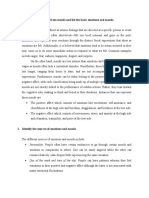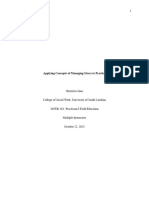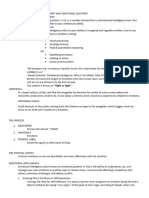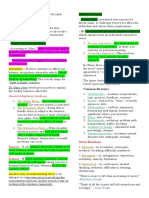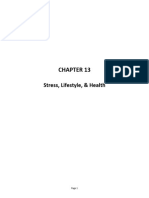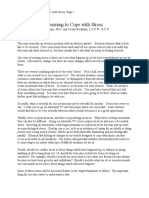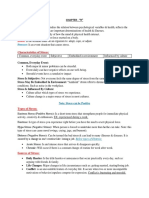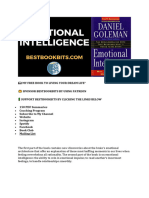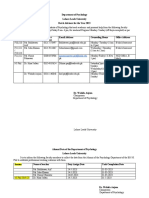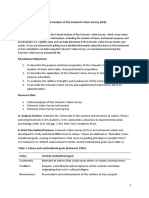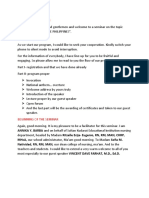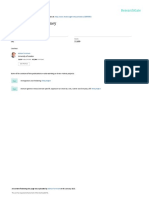Emotional Intelligence Instruments
Reflect on what you learned about the concept of emotional intelligence based on what
you read in your textbook and online. Based on your results with the EI tools, what
would you consider to be your strengths and weaknesses with respect to emotional
intelligence? Discuss the concept with a loved one, friend, or trusted colleague. What
are their perceptions with respect to your self-appraisal?
Your Answer:
With the first test of the Emotional Intelligence Quiz, I scored an EQ level of excellence.
Per the test scoring this high means there might be a caveat. I am either extremely high
in emotional intelligence or extremely low. So I asked a friend for clarity, and she said
that I am very self-aware, so I must have assessed myself accurately. She mentioned
that I could read people well and feels that contributes to the high score on the test.
As for the Emotional Intelligence Quiz that references body language, I scored a 14/20.
I don't consider that to be a good score, but according to the test I am slightly higher
than average at reading expressions. According to the test this is a skill that can be
developed using empathy training.
Radical Experiment in Empathy
What did you think of the "Radical Experiment in Empathy" video? Were you able to
“step outside of your thoughts and behavioral patterns” and reserve a part of your
mental capacity to “listen” to and monitor your internal reactions as a means of gaining
a deeper insight into the nature of yourself? What’s your perspective on this notion of
“self-awareness” in the present moment as a tool to learn more about yourself? Was
this “radical experiment” an effective one in terms of helping you understand the
concept of empathy?
Make some connections between the “Radical Experiment in Empathy” TED Talk and
the ideas you have been reading and learning about this week. Be sure to describe
your connections carefully and use in-text cites as applicable.
Your Answer:
I thought the video was very informative on sociology and how it relates to empathy.
Yes, I was able to step out of my thoughts and behavioral patterns. I could feel the hurt,
fear, and anger; compassion, or empathy for people that are affected by the situation. I
think this is an effective radical experiment in helping me understand the concept of
understanding. I have never looked at Americans from a different perspective. How
could Americans come in and try to steal/take resources, change religions, and dictate
what happens in another country? For example, when I think of Christians, I envision a
loving and supportive religious group, but for the video, the Christians were considered
invaders. We tend to stay in our small world without considering others and
understanding a new perspective. I feel like this relates to what is going on in the world
right now. People are comfortable with not knowing or acknowledging others'
perspectives.
�Stress: Portrait of a Killer
Contrast your textbook’s discussion of stress with National Geographic’s documentary
“Stress: Portrait of a Killer.” What, specifically, was most interesting to you with respect
to the film? What kinds of connections can you make between stress, personality, and
human behavior in the workplace? (Be explicit)
Provide a couple of examples of specific stressful situations from your life – as well as
your own stress-related behaviors in those instances.
What stress management approaches work best for you? Based on what you learned
here, what might be some additional strategies you might employ to reduce your
stress?
Your Answer:
The most exciting aspect of this short film is how much we worry and stress. Some of
the pressures of stress are good, while others wear us down. For example, a good
stressor would be a roller coaster ride at an amusement park. Initially, the purpose of
stress was to allow us to react as a survival tactic. Chronic stress can kill brain cells,
add fat to our bodies, interrupt our bodies natural ability to heal itself, and unravel
chromosomes. Stress is defined as the body's reaction to a change in physical, mental,
or emotional adjustment or response.
Some examples of stressful situations from my life would be my seven children and the
death of my brother. Some of my stress-related behaviors are poor sleep habits, bad
diet (overeating), and increase the use of alcohol.
The stress management approaches that work best for me include keeping a balanced
diet, breathing techniques, and maintaining a positive attitude. I also like using time
management techniques and tools to assist with keeping a schedule. One strategy that I
have learned about and want to implement is the ability to understand what I can
control. Stress today can affect the body in the years to come. I don't want to die from
stress.


